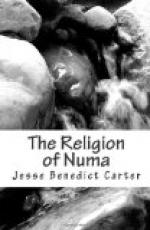In the first decade of the republic therefore, as we have seen, a group of Greek gods was introduced by the Sibylline oracles, no one of whom can be said to have been really needed, no one of whom except the sea-element in Neptune represented any new and vital principles not already present in the religious world, if not of Numa, at least of Servius. The best that can be said of these gods is that one or two of them, notably Mercury and Neptune, exerted no positively detrimental influences on later generations. For the next two centuries our chronicles are silent, so far as the actual introduction of new deities by the aid of the books is concerned, and it is not until B.C. 293 that the narrative of new gods begins again. But in other ways the oracles were not idle during these two hundred years. We must rid ourselves of the idea that it was necessary that their consultation should always result in the importation of some new Greek deity. The oracles might order the carrying out of some new religious rite regarding the deities already present, and these religious rites, especially the public processions so frequently performed, feed the ever-growing superstition of the populace. It is essential to a charm or incantation that it should contain something strange or foreign, it is above all things help from without; and when the gods send prodigies and portents, when their statues weep and sweat blood, when cattle speak, and meteors fall from the sky, something strange and unusual must be done to counteract these things. Among the foreign acts thus ordered the sacred procession occurs frequently. It started from the temple of Apollo in the Campus Martius and passed into the city through the Porta Carmentalis, went across the Forum and then outside the pomerium again to the temple of Ceres, and then to the temple of Juno Regina on the Aventine. It was therefore a power from without which came into their city to purify them and to carry away out of the city again the impurities of which it had rid the community.
It is also characteristic of such semi-magical things that they lose their effects after a few applications, and other things must be sought always more complicated and more strange. Thus from the beginning of the republic down through the Second Punic War we have a series of extraordinary measures, growing more and more complicated until in the religious frenzy of the years after Cannae even human sacrifices are performed at the command of the books. In this the third century before Christ deities begin again to be introduced, and it is to this century that we now turn.




